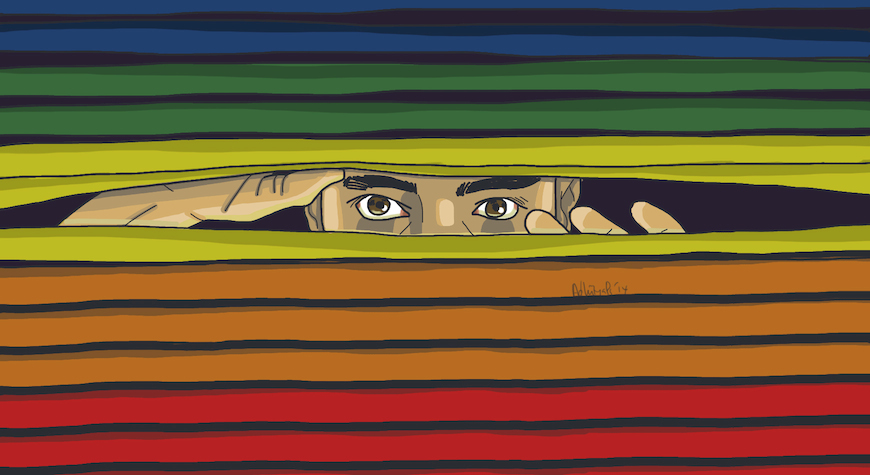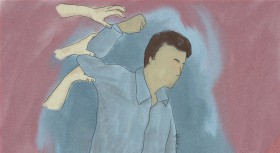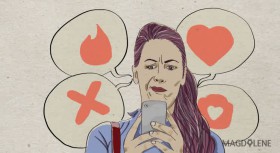The center offered to provide a counseling service to help young students who are homosexuals understand their sexual orientation. Upon finding out about them, the Minister of Research and Higher Education Mohamad Nasir made a controversial statement that the LGBT community should not carry out any activities deemed immoral in campuses. It raised people’s curiosity; what do LGBT people do at universities? Do they spread propaganda? Are they dangerous?
No one knew I was gay when I began my study at the English Department, Faculty of Humanities, at University of Indonesia (UI). Because of my conservative values, I decided to join an Islamic students forum called Formasi. I attended their gender-segregated meetings and I listened to preachers’ sermons.
At the gatherings we were told we were facing Ghazwul Fiqri, or a war of thoughts. Muslims were said to be threatened by Sepilis, a derogatory term which stands for Secularism, Pluralism and Liberalism. The term became even more popular as the Indonesian Ulema council (MUI) declared that these theories were haram.
Not long after the war against Sepilis, feminism was also labeled as a dangerous theory.
Feminism as a theory was often mentioned in my classes and seminars. When I learned there was a subject called Kritik Sastra Feminis, I was eager to attend the lecture and find out more about it. My intention was to find its flaws and prove the superiority of Islam over it. I didn’t expect that this theory would be the door to understanding my suppressed desire.
When studying this subject, I learned about the difference between the term gender and sex. I also learned that the gender roles men and women have to fulfill were merely a social construction. These perceptions have created discrimination and inequality.
An example of this is my mother’s experience when my grandfather passed away. When my grandfather became sick, my mother began to spend more time looking after him at his house. My brother who lived with my grandfather also took care of him; he accompanied him when he had to be hospitalized and did not attend classes for several days.
When my grandfather passed away, my uncles decided to share the inheritance in the Islamic way. My mom only received a third of the inheritance, less than her brothers. One of my uncles said that he would give a part of his inheritance to my mother, but he did not fulfill this promise.
Although my family was conservative, we found this unjust. My brother said that in the past women got only one third of the inheritance because they were not supporting their families financially. However, my mother was a career woman and she deserved to receive as much of the inheritance as her brothers. I learned then how people could use religion and gender role to serve their greed.
Despite my criticism of my uncles, I also committed a repugnant action to a woman. When I was still in college, I had a girlfriend. She was extraordinarily smart and wore a hijab. In order to cure my homosexual tendency, I planned to marry her and start a family as soon as I graduated. But she didn’t know my sexual orientation.
Although religious advice led me to think that marriage would help me, I was never told to be honest to the women I wanted to marry. Studying feminism, however, had helped me realize that I was treating her as a tool to achieve my goal. I was being unfair to her. She had the right to know my sexual orientation.
We were sitting in front of her house when I finally decided to tell her, with a trembling voice, that I was gay. I was ready for her rage as all this time I had been faking my interest in her. Instead of being angry, she grabbed my hand and said, “It’s okay.” It was a moment I could never forget in my entire life. It brought me relief, but, at the same time, confusion.
Naturally, sex is a normal part of a marriage. Once when my girlfriend and I visited my family’s house in Sukabumi, and because my parents were in Jakarta, we slept on the same bed facing each other. I wanted to do something to arouse my sexual desire, but it didn’t work. My biology did not respond to her. I told her that we shouldn’t do this as our religion forbid it. I knew that I was not able to satisfy her sexually.
At university I also learned Social Studies, which introduced me to Constructivism and Deconstructivism. I examined how my religious stance was built in binary opposition and impaired my logical thinking. With an open mind, I then began to read different thoughts in Islam, writings by liberal Muslims and Islamic scholar Musdah Mulia, and saw their logical explanations, instead of merely focusing on their controversial outcomes.
I also realized how power controlled the dissemination of knowledge and our understanding of who we are. I realized the ulema’s interpretation of Islam had shaped the way I understood my sexuality. Then I began to read opposing views, the scientific ones, and I came to understand why I couldn’t change my sexual orientation.
Although I was unsure about what kind of life I wanted to live, I knew my life would certainly be different from others. If I had to suffer, I’d rather suffer alone. I contacted my girlfriend to meet up. Although everyone thought we were cute together – our parents had met and she had a good relationship with my mother – I knew we had to break-up.
I came out to all of my friends but I did not date a man until I graduated; I only dated my new understanding of myself. If someone asked me, what does a homosexual do at University of Indonesia, I would say we study, discuss and figure out ourselves. And if these activities were forbidden, that would be an immoral policy that we have to fight.
Noor Ramadani is the author of Salim's Secret.








Comments